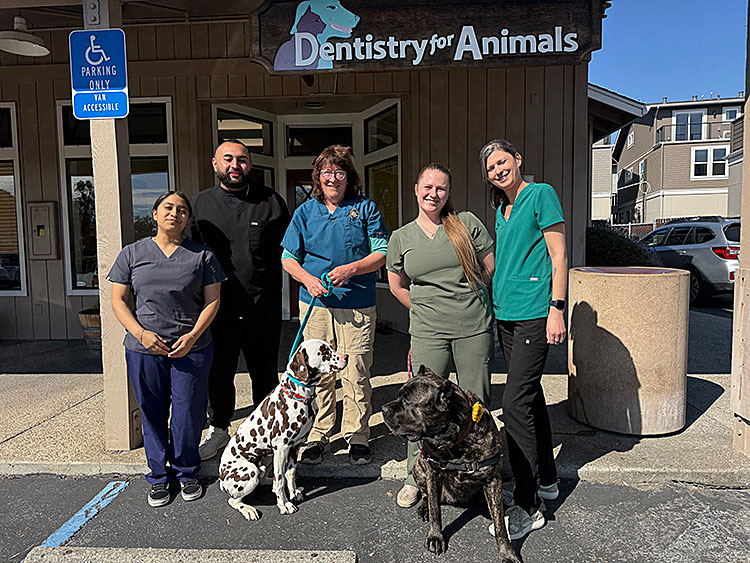By Teresa Hidalgo Dance
Animal dentists are a breed apart. They work in one of only 20 veterinary specialties recognized by the American Veterinary Medical Association. Standing out in such a narrow field is the Dentistry for Animals clinic in Aptos.
Led by Dr. Judy Force, DVM, the animal clinic offers a wide range of services that see to the oral health and care of cats, dogs, and the occasional marine mammal or other wildlife.
 Animal dentistry was still on the margins of academic interest when Dr. Force graduated in 1986 from the School of Veterinary Medicine at the University of California in Davis. Nevertheless, Dr. Force was drawn to the specialty and took in every study course she could find, including weekend continuing education classes given by veterinary dentistry pioneers, Drs. Barry Staley and Michael Floyd.
Animal dentistry was still on the margins of academic interest when Dr. Force graduated in 1986 from the School of Veterinary Medicine at the University of California in Davis. Nevertheless, Dr. Force was drawn to the specialty and took in every study course she could find, including weekend continuing education classes given by veterinary dentistry pioneers, Drs. Barry Staley and Michael Floyd.
A serendipitous encounter with a backroom of animal dental equipment rounded off her early training. She had asked to shift to general practice at a veterinary hospital in Santa Cruz after the hours at the emergency ward started to wear her thin. Supervisors answered, “We have plenty of general practitioners but we have all this dentistry equipment nobody is using.” Dr. Force became excited. “Really? Where?” she asked.
And that’s how she met her calling in a little unused room, which you got to “through a courtyard and around the corner,” directions much like a map to a hidden treasure which this backroom of dental equipment was to Dr. Force.
Eventually, she would complete a fellowship in animal dentistry in the Academy of Veterinary Dentistry with Michael Floyd as her mentor. She studied much harder and became board certified in veterinary dentistry in 2014, completing her formal education.
Dr. Force practices at her clinic with Dr. Cesar Vega, DMV (her 3rd year resident), and nearly a dozen staff.
The clinic boasts the use of state-of-the-art technology. The Cone Beam CT which gives advanced 3D imagining is a necessity for nearly all its patients. Their laser therapy helps reverse periodontal disease in cases that can still be treated. A Piezotome machine is on hand for mandibulectomies and maxillectomies.
Dr. Force describes, “We do surgeries for oral tumors and the Piezotome is a wonderful machine for that. It helps with really difficult extractions, especially in older, big dogs.”
The most common dental problems that Dr. Force and her staff encounter are periodontal disease and broken teeth. Dr. Force’s best advice for home care is tooth brushing at least three times per week.
It also helps to give a dental diet and the wise use of treats that double as preventive agents of diseases such as gingivitis and are approved by the Veterinary Oral Health Council.
Dr. Force adds that getting pets used to having their teeth brushed at an early age makes a huge difference in their oral health.
Dr. Force’s primary way of giving back to the community of veterinarians is lecturing for the local veterinary association and at the biggest continued education events in the field–the Veterinary Dental Forum in the U.S. and the European Dental Forum. The topics she speaks on generate a lot of interest such as the safe use of anesthesia for animal dental patients, the important but sometimes unheralded work of feline dentistry, the cone beam CT machine in dentistry, and even marine mammal dentistry based on her involvement with the Marine Mammal Center and the Monterey Bay Aquarium.
When the COVID pandemic struck, the European forum slated to be held in Nice, France, was moved online. “I was lecturing from my living room,” said Dr. Force of this time. “I’d rather be in France than in my living room but that’s okay, you know?”
To Dr. Force, the forum’s lectures were paramount, whatever the drawbacks.
Dr. Force wants new veterinary graduates to know that there is more to veterinary dentistry than they think. She’s heartened by veterinary schools working hard to expand the teaching of animal dentistry and making it more accessible.
“Animal dentistry is a big part and an important part of health care for our animals. So they live longer, healthier, happier, pain-free lives when their mouths are healthy,” said Dr. Force of the once-overlooked field.
Dr. Force keeps a Dalmatian, two cats, and three horses at her home. As a lover of animals, she says with affection, “I get along well with them. They’re just a little being and they can’t talk so it’s always fun to be able to communicate or figure out what they’re trying to tell you.”
She does that exceptionally well at Dentistry for Animals all the time.
•••
Dentistry for Animals is located at 8035 Soquel Dr., #45, Aptos. Contact them at 831-768-7148 or [email protected]. You can also visit www.dentistryforanimals.com. Hours are Tuesday, Wednesday and Thursday (8-5), and two Saturdays and Mondays per month for appointments.



